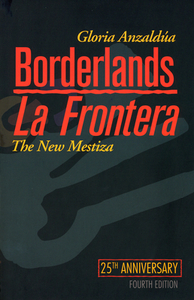You need to sign in or sign up before continuing.
Take a photo of a barcode or cover
astoundingly confusing! but i can appreciate and understand some of the messages within. anzaldúa really did have a talent for mixing the personal and historical into one. but the inability to understand some of the text, while intentional, still leads to a slight disconnect between reader and anzaldúa.
Anzaldúa articulates a unique perspective on the identity of the borderlands. Unfortunately, I have no grasp of any form of Spanish, so many of her insights are lost to me. But that's quite fitting in terms of what she's trying to articulate.
informative
inspiring
medium-paced
challenging
dark
informative
reflective
slow-paced
Teoría feminista decolonial desde el cuerpo, la experiencia y la poesía. Exquisito.
challenging
emotional
informative
inspiring
reflective
It's astounding and a little heartbreaking how much even some 30 something years on how Anzaldua's combination of prose, poetry, theory and personal narrative still resonate so much today. There is plenty that more intelligent and immersed scholars and activist have said about this work that are probably worth reading, but for my own part I'm just really glad I had the chance to read the work in full and mull a bit over it. I'm always learning and growing and having this foundation beyond excerpts picked to support or use for class work, but the chance to engage with her writing on my own terms and to my own understanding is something I feel will be transformative down the line. Really thankful that this work exists and is still so integral to Chicana literature as a whole.
My experience of reading this book as a feminist white woman was interesting. So many passages resonated with me, although I also feel it important to note the distinction between saying they *resonated* with me and saying I *related* to Anzaldua's perspective. The process of reading this book is a process of examining your own intersections of race, geography, gender, sex, religion, spirituality, and culture. Sometimes you bump up against something in this book that you can't claim or own, although you find it beautiful. A few pages later you encounter something that feels like it really articulated something you've always felt and wanted to say about your own life. That's one of the magical things about Anzaldua's exploration of living in various borderlands, between genres, between races, between countries, between cultures, between generations, between spiritual outlooks, etc., and why this book is such an important foundation for current conversations about intersectionality-- finding where you intersect with Anzaldua and where you find a wall is just as educational as what she shares about her experience.
This novel(?) is a summary of the situation of US/Mexico border people, and then some poetry about it, with a lot of Spanish in it. I never understand what I'm supposed to do with this kind of literature. It makes me feel weird about being white. Like, it's stupid that people I share a race with were mean to the people who were already here, but I feel like there's not much I can do about it, besides trying not to be racist. Anyway. I'm still trying to figure out how I feel about it. I learned a lot about Chicano/border culture, but I wouldn't call it "fun" reading.
Borders are set up to define the places that are safe and unsafe, to distinguish us from them. A border is a dividing line, a narrow strip along a steep edge. A borderland is a vague and undetermined place created by the emotional residue of an unnatural boundary. It is in a constant state of transition. The prohibited and forbidden are its inhabitants.
One of those books I've been meaning to read for many years, Borderlands / La Frontera was a groundbreaking book when it was published in the late 1980s and the term "intersectionality" hadn't been coined yet. Today (hopefully) the concept of enmeshed oppressions is more familiar, though her framing of Mexico's history from an Aztlán perspective will likely be less so. In today's political climate, that view of the space where the US and Mexico meet is more important than ever, but that is not the only dividing line established here. Read more on my booklog
One of those books I've been meaning to read for many years, Borderlands / La Frontera was a groundbreaking book when it was published in the late 1980s and the term "intersectionality" hadn't been coined yet. Today (hopefully) the concept of enmeshed oppressions is more familiar, though her framing of Mexico's history from an Aztlán perspective will likely be less so. In today's political climate, that view of the space where the US and Mexico meet is more important than ever, but that is not the only dividing line established here. Read more on my booklog





